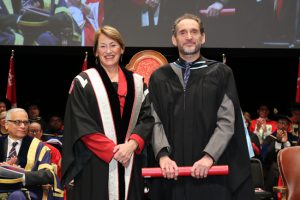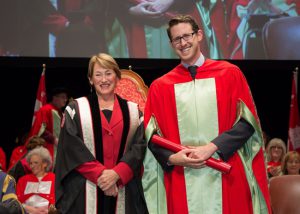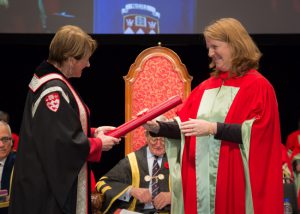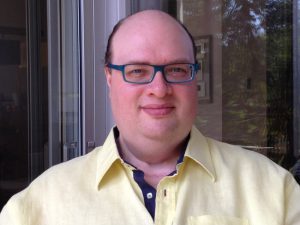 At today’s Convocation ceremonies at Place des Arts, the spotlight was on McGill’s newest graduates as they crossed the stage to receive their degrees. But the University also took the time to acknowledge the efforts of five outstanding teachers by handing out the annual Principal’s Prize for Excellence in Teaching in the following categories: Course Lecturer; Faculty Lecturer, Assistant Professor, Associate Professor and Full Professor.
At today’s Convocation ceremonies at Place des Arts, the spotlight was on McGill’s newest graduates as they crossed the stage to receive their degrees. But the University also took the time to acknowledge the efforts of five outstanding teachers by handing out the annual Principal’s Prize for Excellence in Teaching in the following categories: Course Lecturer; Faculty Lecturer, Assistant Professor, Associate Professor and Full Professor.
“The Principal’s Prize for Excellence in Teaching was established to recognize excellence and commitment in teaching and to celebrate those who are exceptional in demonstrating these qualities,” said Professor Angela Campbell, Associate Provost (EAP) in introducing the recipients. “The winners we honour today embody the best of teaching and mentoring.”
Department of Languages and Intercultural Communications, School of Continuing Studies
Principal’s Prize for Excellence in Teaching in the category of Course Lecturer

Bruce Manson was teaching English as a second language at a private institute when he heard that McGill’s Department of Language and Intercultural Communication was hiring English language teachers. Manson applied and was hired as a course lecturer in 1992.
In presenting Manson with his Principal’s Prize during the morning Convocation ceremony, Professor Angela Campbell said this: “Bruce is a thoughtful and dedicated instructor. He strives improve students’ knowledge of English by going beyond the basic curriculum and integrating activities that promote cultural exchange and discussion. His students speak highly of his enthusiasm and ability to motivate them as he endeavours to build their self-confidence throughout the learning process.”
Here is the Reporter’s interview with Manson.
What do you remember most about your first teaching experience?
I felt very nervous and awkward the first day I entered the classroom as a teacher. I was really insecure and thought, “Who am I to be up here, speaking in front of all these people?” Shortly after that, a colleague helped me put things into perspective by simply pointing out that teachers have knowledge in a particular subject area that the students don’t have, and that the teaching process involves us sharing what we know with our students. When I framed it in that manner, the nerves started to subside.
What are the best things about being a teacher?
The job is rewarding on many levels. It’s satisfying knowing that my colleagues and I are helping our students lay the foundation for their careers as well as their future in a more general sense. It’s also gratifying to see the personal growth that many of our learners experience.
I look back at my time as a student as a pivotal period in my life, and I realize that if we create the right learning environment, not only will our students increase their mastery of the subject matter at hand, but they will also learn critical analysis and self-reflection skills. This, in turn, can lead to the questioning of old thought patterns and new ways of seeing the world.
In the classroom setting I’m describing, I, too, learn a great deal and my perspectives are consistently challenged. This ideally leads to all of us, myself included, developing more informed, open, unbiased, inclusive ways of seeing the world around us.
What are the biggest challenges?
One of the biggest challenges as a teacher is giving the students the time and attention they deserve, yet still finding time for a balanced life.
In language teaching, as in many domains, it really benefits our students if we have one-on-one progress analysis sessions with them, make ourselves available after class to answer questions, honour special requests that individual students might have, provide detailed feedback on their papers and assignments, and so on.
It’s hard to “turn it off” sometimes, pull back a bit and have a balanced life when you know that if you don’t “turn it off” and you continue to give more, it will be to the students’ advantage. Striking that balance is hard but necessary.
How do you create a strong connection with your students?
We intuitively know, and we come to see this more as we gain experience as teachers, that if we are upright and fair with our students, they will respond positively and a positive connection will be created. Students appreciate it when a teacher is organized, clear, patient, understanding and respectful. I try my best to keep this in mind and create a healthy learning environment with positive classroom dynamics.
How would you describe McGill students?
The students I work with are great. The student body in our department is made up largely of international students, along with some Quebeckers, and the make-up of a typical class is an interesting mix of people from various backgrounds and at various stages in life. I like that this contributes to greater diversity on campus, as I firmly believe that diversity makes us stronger. It also consistently creates a vibrant classroom setting, one in which the students learn from me, learn from each other, and one in which I learn a great deal from them.
What advice would you give a teacher just starting out on his or her career?
You need to have a passion for what you do. Without that passion, you won’t be able to put in the work necessary to do your job well and give your students the learning experience they deserve. Having said this, you also need to have a well-rounded life outside of your career, because without that balance, you can burn out quickly.
****
Department of Chemistry, Faculty of Science
Principal’s Prize for Excellence in Teaching in the category of Faculty Lecturer

Dr. Laura Pavelka has been a faculty lecturer in the Department of Chemistry since 2012. Prior to that, she completed her BSc and PhD in chemistry University of Western Ontario (now Western University), held a postdoctoral position at Stony Brook University in New York, and did a one-year stint back at Western as a lab coordinator/instructor and part-time postdoc. During her postdoc in New York, she also taught general chemistry at Hofstra University. “It was during these two teaching positions that I realized I was more interested in teaching than pursuing a research career, so I started applying to teaching positions (including the one at McGill),” says Dr. Pavelka. “Luckily, things worked out.”
In her citation about Pavelka at this morning’s Convocation ceremony, Angela Campbell, Associate Provost (EAP) said Dr. Pavelka receives high praise from her students and colleagues. “Passionate, kind, innovative, highly organized and very knowledgeable are but a few of the many qualities used to describe Dr. Pavelka… A gifted teacher, Dr. Pavelka exemplifies the important qualities of mutual respect, patience and humour – all essential in creating a dynamic and interactive learning environment even in very large courses with enrolment of over 500 students.”
The following is the Reporter interview with Pavelka
When did you know you wanted to be a teacher?
I have always enjoyed explaining things to those around me and learning as I do it. This is what drew me to research in chemistry. I also did lots of tutoring in high school and university, taught swimming, lead a troupe of girl guides and demonstrated labs. I really enjoy the personal connections and sharing my excitement for different topics with others.
But it was not until my postdoc in New York that I realized that teaching was more important to me than research. I looked forward to my teaching days more than anything else. I am so grateful that every day is a teaching day now.
What is the best thing about being a teacher?
Sharing your excitement about a topic you love with someone new and seeing the excitement ignite within them. Some of my favourite moments are overhearing students discussing and debating topics from my classes. I also love that I get to interact with so many passionate, talented people every day – both students and staff.
The biggest challenges?
The biggest challenge is reaching out and getting to know every student. I teach very large classes (400 – 1,000 students), so this is my Everest. I remember what it feels like to be one of many hundred in a university-level course and how lost that can make you feel. Each year we try to do more to make sure no student is left behind, but there is still a long way to go.
Do you have a teaching philosophy?
My teaching (and life) philosophy is one that encompasses three main pillars: mutual respect, patience and humor. In class, I always try to give my students my undivided attention, listen to their questions, but also have a bit of fun. Using this approach, I have seen many wonderful things happen in my classroom, including the undivided attention of my students and the creation of a dynamic, interactive learning environment
How do you develop a strong connection with your students?
Honestly, it is not something I have actively worked at. From the beginning, I have taught in my own, interactive style and respected my students. I often get the comment that I am the “most human” professor a student has had at McGill. Just shows that letting your guard down, being open about your own struggles when needed, and truly caring about your students’ well-being goes a long way.
How would you describe McGill students?
McGill students are very smart and very driven. I follow many students through their first two years at McGill, by teaching both General Chemistry and Organic Chemistry. It is a pleasure to watch them learn and grow.
What advice would you give a teacher just starting out on his or her career?
There is no one teaching style that fits all, so be yourself. Try new things and find out what works for you. Don’t be afraid to be different. My students have stood by me as I try all sorts of crazy things (some better than others) and I am a much happier and a much better teacher for it. This means there is a lot of upfront effort, but it is totally worth it. Just make sure you expect some long days in the first couple of years.
****
Department of Jewish Studies, Faculty of Arts
Principal’s Prize for Excellence in Teaching in the category of Assistant Professor

Daniel Heller joined McGill’s Department of Jewish Studies in August 2013, after a one-year postdoc at the University of Washington. He completed his PhD in History at Stanford in 2012.
“After only 3 1/2 years [at McGill], Professor Daniel Heller has had a profound and positive impact on the Department of Jewish studies,” said Professor Angela Campbell, Associate Provost (EAP) during the presentation of the Teaching Prizes. “Driven by his exceptional skills, critical acumen and genuine passion for the subjects he teaches, he has injected intellectual excitement in some of the most controversial and challenging topics of our time.
“Thoughtful, engaging, passionate and very funny, teaching for Prof. Heller is more than a profession or a job, it is his vocation.”
The Reporter spoke to Professor Heller about his views on teaching.
When did you know you wanted to be a teacher?
For as long as I can remember.
Do you have a teaching philosophy (philosophies)?
I consider it to be a tremendous privilege to work with McGill students, and feel a deep sense of gratitude for the opportunity to share with them my enthusiasm for the study of History. Through our explorations of the past, historians teach students how to ask thoughtful questions of the world around them; to beware of broad sweeping generalizations and swift, simple answers to complex problems; to seek out a diverse range of perspectives; and to measure the worth of these perspectives according to the quality of evidence upon which they are based.
As a history teacher, I enjoy introducing my students to the adventures of historical research by giving them as many opportunities as possible to interact with a wide variety of historical sources, from diaries and literature to music and art. By pairing these sources with historical scholarship that present a range of perspectives and methodological approaches, I encourage students to critically examine the ways in which historical sources are interpreted.
One of the greatest privileges of teaching History is that I get to cultivate a classroom environment in which students can engage in respectful dialogue about controversial topics. When teaching courses on the Arab-Israeli conflict, I invite students to draw upon the tools of historical analysis to avoid the hostile polemics that so often characterize conversations on the topic. I also encourage them to adopt the historian’s spirit of intellectual curiosity and sensitivity to bias (theirs and others) in the learning we undertake together.
Each time I teach the History of Zionism, I am challenged to rework the syllabus to best capture the diverse range of views expressed by the Arab-Israeli conflict’s participants and observers.
In the Fall of 2015, I introduced a new component to the course: an online forum on mycourses called the “counter-syllabus.” The forum provided an opportunity for students to share with their peers, historical evidence and scholarship that expanded the range of voices and perspectives provided on the official syllabus.
Students were required to write one paragraph that addressed how their chosen source challenged the narrative presented in class. In addition, they were expected to identify the potential limitations of using the source as historical evidence, including the biases of the author.
By creating the forum, I encouraged students to critically reflect on the ways in which the history of Zionism was being narrated in class, take ownership of their learning process, and assess the potential pitfalls of the very sources they sought to introduce to class discussion.
What are the biggest challenges in teaching?
As a scholar of twentieth-century Jewry, I have the unfortunate task of presenting a turbulent history upon which ethnic and religious hatred has left a profound mark. Historians of this period often behave like forensic scientists, seeking to uncover the conditions that led to horrific crimes. I have come to realize, however, that it is critical to remind our students that human life is more than the sum total of our mistakes. Whether teaching courses on the Arab-Israeli conflict or ethnic violence in Europe, I am increasingly giving space in my syllabi to voices of historical figures who, going against the grain of history, resist the fires of hatred and engage in acts of empathy and kindness towards the “Other.”
What do you remember most about your first teaching experience?
My sense of wonder and excitement when I saw my students interpreting the course readings in such diverse ways. Not a class goes by that I do not learn something from my students. Their perspectives greatly enrich my own understanding of the past.
****
Department of History and Classical Studies, and Institute of Islamic Studies, Faculty of Arts
Principal’s Prize for Excellence in Teaching in the category of Associate Professor

Professor Laila Parsons came to McGill 13 years ago from Yale where she taught in the Department of History. Every week, Parsons would have to commute to Yale from Cambridge, Massachusetts, where she lived with her husband and children. “When McGill offered both me and my husband jobs, we jumped at the chance to be able to work together at a great research university and in a wonderful city like Montreal,” she said.
In presenting Professor Parsons with her Principal’s Prize during the afternoon Convocation ceremony, Angela Campbell, Associate Provost (EAP) noted that “the subjects Professor Parsons tackles can elicit emotional debates. However, with her wonderful teaching skills she is able to create and maintain a considerate and respectful environment that is always understanding of students’ diverse background, experiences and perspectives.
“Students admire and praise her profound knowledge of her field, her fearless engagement with challenging issues and her skill at stimulating interest.”
Here is the Reporter’s interview with Professor Parsons
What do you remember most about your first teaching experience?
My first teaching experience was working as a Teaching Assistant in an introductory Arabic class. I was absolutely terrified and had put hours of preparation into a single 50-minute class, in an attempt to anticipate every possible obscure grammar question that a student might ask me.
Of course, nobody asked the questions that I had prepared for, but I did learn an awful lot in the process about the intricacies of subject-predicate agreement in Arabic!
Do you have a teaching philosophy?
I don’t really have a detailed, programmatic philosophy of teaching, but I try to abide by some basic guiding principles. These include: being intellectually honest; maintaining high expectations of all students; bringing your own research into the classroom so that you can convey to students the excitement of original research; and never, ever using your power as a professor to browbeat students who might disagree with you.
What is the best thing about being a teacher?
The best thing is that you continue to learn while teaching. You learn from having to construct a syllabus; you learn from intensive preparation for class; and you learn from the students’ responses to the material. Sometimes I feel like I only really started learning when I began teaching.
When intellectually curious and engaged students come together to debate a particular historical issue, there is a wonderful energy in the classroom. It’s an energy that you don’t find in other aspects of academic life.
What are the challenges?
It’s a challenge to keep yourself from talking too much, particularly if the topic is something that you have done a lot of research on. Instead of just imparting information to the students, you need to let the students find their way through the material; that way, they own their knowledge.
How do you develop a strong connection with students?
This is a hard question to answer. Part of it is that the students and I are actually learning together, especially in upper-level classes, so it is easy for us to share our intellectual excitement when thinking through a particularly complex historical moment.
Also, understanding primary sources from the past requires that students and teachers try to dislocate themselves from their own place and time and individual life experience. Everyone in the classroom can connect more easily with each other when engaged in this collective effort.
How would you describe McGill students?
I have taught at Harvard, Brandeis and Yale and generally speaking, the McGill students are the best students I have ever taught. Apart from being very hard-working and intellectually strong, they are open, curious and creative. I feel privileged to teach McGill students.
What advice would you give a teacher just starting out on his or her career?
Understand the power you have over students, and be very careful with that power. Always remind yourself to put yourself in the position of students and imagine how your actions might appear to them. Be as fair as you possibly can.
Don’t be defensive: students will still respect you if you get something wrong or don’t know something, as long as you admit it openly. Every student has something important to bring to the classroom, and it is your responsibility as a teacher to help each student develop their potential.
Department of Art History and Communication Studies, Faculty of Arts
Principal’s Prize for Excellence in Teaching in the category of Full Professor

Professor Jonathan Sterne is in his thirteenth year at McGill. He is currently on sabbatical at the Max Planck Institute for the History of Science for Fall 2017, and was not present at today’s Convocation ceremonies.
Do you have a teaching philosophy?
I want to help my students to be better citizens of reality. But when you get right down to it I’m just trying to play a long game: Sure, I want students to show up to class prepared and to understand what we’re covering. But I really want our time together to help them become original, creative, ethical thinkers in their own right, for the rest of their lives.
What are the best things about being a teacher?
I love it when my students surprise me in terms of how they think through an issue or a problem. My undergrads teach me about new corners of the world we live in and new ways of being in the world. They bring fresh and diverse experiences and questions into my classrooms.
My grad students educate me on new literatures and ways to be a better scholar, and have inspired me outside of work in areas like art, music and political activism. They are also consistently idealistic about what the life of the mind should be, and I really appreciate that. Lots of my grad students have published and I get to cite them in my own work – that’s a thrill every time.
What are the biggest challenges?
Two, both coming from the outside world.
Students know that there are a lot of crises happening all at once – from conflicts local and global, to the destruction of the planet, to the increasing concentration of wealth, to the resurgence of nativist and racist movements. Sometimes scholarship can speak to that, but sometimes we also have to step back and take time for learning that won’t be immediately applicable today. It’s hard to balance those two demands.
Students are also constantly targeted by corporations that want to use their attention as a commodity, meaning that there are more – and more powerful – demands on their thought than ever before. I want to create spaces and times for sustained, intensive thinking together. That’s very different from how most of the rest of their worlds are telling them to be.
What do you remember most about your first teaching experience?
The first day of my first-ever class as a teacher, in September 1994, went like this: Stand awkwardly in the hall with people I think might be my students while the pervious class finishes up. Bumble into the room. Then terror. Sweating. The need for a drink of water. A room full of first-year undergrads looking at me like I was supposed to know what I was doing. I had a lesson plan, though, so after reading the syllabus to them (I was too freaked out to do anything else), we did some sort of discussion exercise and then it was fine.
How would you describe McGill students?
It’s hard to generalize about such a group of diverse undergraduate and graduate students, but here goes. McGill students are as strong and well-prepared as anywhere else in the world. They are a delight to teach. They are intelligent, ambitious and curious.
They are also dealing with the world they’ve been given. That’s a challenge for them, but also an opportunity to lead. I don’t think it’s an accident that students are responsible for a lot of the improvements we see around McGill, from a survivor-oriented sexual assault policy, to gender-neutral bathrooms.
If you could change anything about your job, what would it be?
Honestly, more resources for teaching, so we could all focus on the reasons why we are here. The main thing that limits what I and my colleagues and TAs can do with students is limited time, which in part is a function of cuts to budgets and staff, which in turn lead to everyone having more demands on their time and for us profs to constantly hustle for more resources. More TAs, more full-time professors, smaller classes, all of that would be to students’ immediate benefit.
What advice would you give a teacher just starting out on his or her career?
Remember that you’re teaching people for 5, 10, 20 years down the road, not for the test. Have fun.

I nominate Kenneth MacKenzie, statistics lecturer in the Department of Economics. The award for the best administrators and professors goes to Lucy Lach, Andre Costopoulos, and Dimitrios Berk.